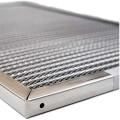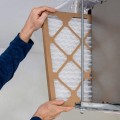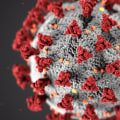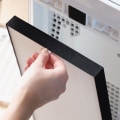For this, the Centers for Disease Control and Prevention (CDC) recommends a MERV rating of 13 or higher. This is more than enough to block droplets and dust particles at least a few microns in diameter. But does a MERV 13 filter meet your needs? A MERV 13 filter is a step in the right direction and captures more particulates than a typical MERV 8 filter. However, it is not as effective at capturing small particles the size of a virus as a HEPA filter.
A MERV 13 will trap less than 75% of air particles that are 0.3 to 1.0 microns in size (the coronavirus is 0.1 microns). It can be difficult for many existing HVAC (heating, ventilation and air conditioning) systems to adopt a MERV 13 due to the increased load on the fan by the finer filter media, which can actually cause more harm than good, as well as reduce airflow if your system is not designed to handle that type of filter. On average, many installations are limited to one type of MERV 8 or MERV 9 filter. MERV 1 is classified as a filter that can only capture less than 20% of particles less than 10 microns wide. MERV 17 to 20 will also capture virus carriers, carbon dust, combustion smoke, radon progeny, and microscopic allergens (particles 0.3 microns in size).
Alternatively, you can upgrade the ventilation system itself, making it suitable for at least MERV 13 filters. HEPA filters are the most efficient for residential or commercial use, followed by MERV 13-16 filters. One way to measure the resistance and also the performance of the “Box Fan with MERV 13″ filter device is to measure the air flow. In cases where the ventilation system cannot handle a high-efficiency filter, you can use a portable air purifier, and at the same time upgrade to the highest possible MERV rating with the existing capacity. Considering the threat posed by the spread of COVID-19 and other germs, upgrading a building's air filter to a HEPA is a much more effective step than simply a MERV 13 considering the small size of a virus (0.06-0.12 microns); the more efficient the filter, the better. Because HEPA filters are so efficient, they cause a higher pressure drop than filters with MERV ratings. A filter with a MERV rating of 14 may remove VOC* from the air, while a different filter with the same rating may not be able to do so.
An additional benefit of MERV 13+ filters are the points they provide for earning the LEED (Leadership in Energy and Environmental Design) Green Building certification in the air filtration efficiency criteria portion of the certification. Some high-end filtration systems may carry MERV 17 to 20, and those will be used in cleanrooms, for radioactive and carcinogenic materials, and in facilities manufacturing pharmaceuticals. The most commonly used filters are those in the MERV 13 to 16 range, which capture everything mentioned above, including lead, humidifier, fogger, charcoal dust, legionella, insecticide dust and sneeze cores from copier toner, car fumes and bacteria. So if you're looking for an effective way to protect yourself from COVID-19 and other airborne contaminants, upgrading your air filtration system to at least a MERV 13, or even better yet - a HEPA, is your best bet. You can also purchase cheap high merv filters online that will be delivered right to your doorstep.






